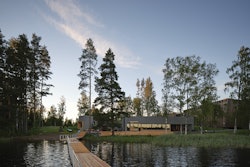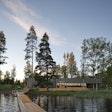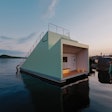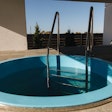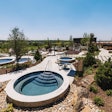The Eyes Of An Industry
Andy Tournas is president of ThermoSpas, a spa manufacturer in Wallingford, Conn. He's also the founder of the International Hot Tub Association, an industry group he formed to address the specific needs of hot tub manufacturers and suppliers. We called him to see if he'd answer a few question. The first part of the interview appears below.
Why did you decide to start up a new hot tub association?
The hot tub industry is a larger industry than most people envision — it's a billion dollar industry when you look at the sale of hot tubs, service, parts and aftermarket products — but it always takes a backseat to swimming pools. That's not a bad thing, but it doesn't give us the opportunity to focus on the specific needs of hot tubs when you're a part of the swimming pool industry.
And there were so many new regulations having to do with hot tubs, whether it be energy regulations, usage regulations, safety, things of that nature, that you really need an organization in place to address those things and respond to government questions. There was no monitoring of new regulations that were coming out, so we were being very reactionary as opposed to being proactive in regards to finding out what was occurring out there so we could address the issues. We weren't looking at things from an engineering angle to determine ways to improve the industry, we weren't talking about ways to grow the industry and get the message across about the benefits of the products we manufacture.
You know, I've been a part of the swimming pool and hot tub industry going on 30 years, and being a member of the board of the NSPI and APSP and being involved with the Hot Tub Council for over a decade, I recognize that the industry is filled with good people willing to do good things. But the swimming pool industry over the last 15 years has been strapped with so many problems — from when the NSPI had the major lawsuit to safety regulations related to drowning and things of that nature — that created an encumbrance on the hot tub industry. And the board that drove NSPI and APSP, over 95 percent of those were members of the swimming pool industry. Now, they were doing a good job, and their hearts were in the right place and they had a passion to resolve the problems in the industry, but there wasn't time or money available to allot to the hot tub industry that it needed for its growth.
What kind of response did you get initially? Did people recognize the need for another hot tub association?
It was a mixed response. There were certainly members of the industry that embraced the idea quickly and with passion. We immediately were able to attract many members from major companies, including Watkins and other spa manufacturers, Balboa, a variety of companies that recognized the need for an independent organization. There were others that said, "Great idea, but let me watch and see what transpires before I invest time and money." And there were others that said, "Look, I just don't want to be bothered with any organization." That was the problem that happened in the NSPI and APSP: You had a lot of hot tub dealers and manufacturers that completely disengaged from the industry because they never saw any worth for the investment. So, after some time goes by and you're not seeing any attention or protection for your industry from the organization that you've hired, you become numb to it. So, you can show these people a plan, but unless you show real performance, they're going to be reluctant to contribute dollars and contribute time.
You also had people who felt we didn't need a new organization; that we already had APSP and that served our purpose.
You mentioned the need to demonstrate accomplishments. Can you talk about some of what you've done so far?
Well, you have to have an overall plan before you start executing anything. We started off with the recognition that protecting the industry was going to be more dominant, more important, than promoting the industry. But at the same time, you can only protect for so long without promoting, or you won't have an industry left to protect. But protection was monumental.
So, we knew we needed a monitoring body to look at regulations that came about that would affect the hot tub industry. That had to be the first step. And, as crazy as it sounds, it had never been done before in the hot tub industry. There was monitoring in place for swimming pools, but not for hot tubs.
So monitoring was very important because it gave us a chance to learn about something before it actually happened; to be a part of the decision-making process.
The other thing, after we learned about what was coming around in terms of regulation, was figuring out how to respond. One of my mandates was that we needed an engineering committee. This was, again, something that had never been done in the hot tub industry. It was not an easy task, because you had to approach all these independent spa manufacturers and spa suppliers and say, "I'd like you to donate an engineer from your staff to work with a team each month and take on a sizable amount of work to look at the new regulations and get an understanding of how they'll affect the industry and determine how we'll respond to the regulations. So the engineering committee became one of the most important things we were doing. I was surprised that even with all the manufacturers and suppliers working with skeleton staffs, as every company in today's environment has been doing, that they all recognized the importance of having an engineering team. So we got a tremendous response from Master Spas, Hot Spring, Gecko, the list went on and on. People said, "My God, this is something we really do need!" And that has been a hallmark of our success. I give a lot of credit to Cindy Magray with Spa Manufacturers in Clearwater, Fla., for that. She's been the liaison between the board and the engineering committee. There's probably no job here that entails more time and work that hers. Along with that one or two hour phone meeting every month, there are late-night hours of investigative work getting to grips with how big of a problem we have, how do we react, all the things that the engineering committee needs to give a report to the board every month. So that's been something that's very, very important.
Comments or thoughts on this article? Please e-mail [email protected].



























